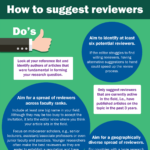You should not underestimate the importance of an effective title. The title is the first thing an editor, reviewer, and reader will see; a title that is poorly constructed may deter viewers from reading further. Titles are also important for indexing purposes; a well-constructed title will make it easier for people searching for papers on […]
A reviewer asks for additional experiments – what are your options?
Requests for additional experiments typically fall into one of three categories: The suggested experiments are fundamental to proving your argument. You cannot accept/reject your null hypothesis without these experiments. You have provided sufficient proof for your argument; however, additional experiments would add weight to your conclusions. You have provided ample proof for your argument; the […]
How to suggest reviewers
Journals often struggle to find willing reviewers, which can lengthen the publication process. To combat this, you may be requested to suggest reviewers at the submission stage. In the following infographic, we provide some tips on identifying suitable reviewers. The infographic contains the following text: Do’s Aim to identify at least six potential reviewers. […]
Discussing your study’s limitations
Why include a limitations section? Including a section on the limitations of your findings will demonstrate command over your research. A reviewer may look negatively upon your study if they spot a limitation that you failed to acknowledge. If you discuss each limitation in the context of future research—i.e., suggest ways to improve the validity […]
Author or contributor? The A to Z of authorship
The average number of authors on scientific articles has increased 5-fold over the last 100 years, from one author per paper in 1913 to more than five authors per paper in 2013 [1], and recent times have seen the rise of hyperauthorship, with one paper listing 5,154 authors [2]. This development has resulted in an […]





